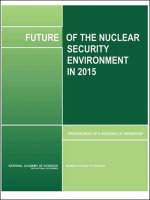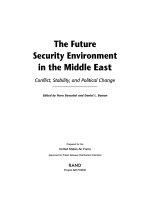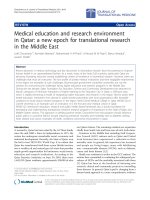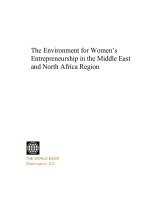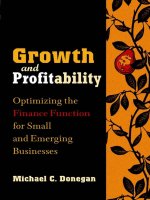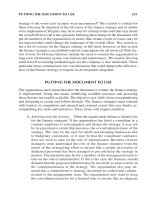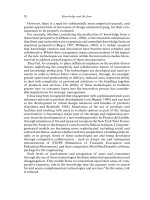The Future Security Environment in the Middle East Conflict, Stability, and Political Change phần 10 potx
Bạn đang xem bản rút gọn của tài liệu. Xem và tải ngay bản đầy đủ của tài liệu tại đây (88.22 KB, 32 trang )
314 The Future Security Environment in the Middle East
• Sustained pressure on regional aggressors. Several regional
states have demonstrated that they will respond to concerted in-
ternational pressure. Iran and Libya, for example, have both re-
duced their support of terrorism to cultivate the goodwill of Eu-
ropean states. If Russia and China became more favorable to
U.S. views, regional states would have additional disincentives to
proliferate or attack their neighbors.
• Reduced military effectiveness of aggressors. Even if area
regimes do not respond to Russian and Chinese political pres-
sure, decreased military assistance will reduce the potency of
their conventional and WMD arsenals.
• Greater potential for progress on an Arab-Israeli ceasefire or set-
tlement. Although the settlement of the Arab-Israeli dispute de-
pends largely on the immediate players involved, a concerted in-
ternational effort might be able to reduce regional tensions and
encourage all sides to sit at the negotiating table.
• Improved anti-terrorism cooperation. Russia and China have
considerable influence with governments in the region and
strong ties to many local factions, making them important part-
ners in the effort to prevent future terrorist attacks against the
United States.
The Nature of Regime Change
Individual leaders have shaped their countries’ policies to a remark-
able degree in the past, influencing the choice of allies, economic
policies, and their willingness to cooperate with the United States,
among other factors. Leaders have often done so in the face of popu-
laces that are opposed to their policies. In Egypt and Saudi Arabia in
particular, the popular resentment of the United States may, in the
future, lead a different leader or regime to curtail ties to Washington
to gain or bolster public support for the government.
Even new leaders who are not hostile pose risks. Untested leaders
may overreact during a crisis, enabling problems to spin out of con-
trol. Inaction is also a risk. Many Middle East countries face a daunt-
ing array of social and economic problems. These cannot be put off
indefinitely, but the risks of dramatic reform may persuade many
leaders to delay change until it is too late.
Conclusions 315
The outlook is not all bleak. Many of the hostile and despotic
regimes in the Middle East are under siege or could face dramatic
change. Iran and Libya are two of the countries that could see a new
leadership, and dramatically new policies, in the coming decade. In-
deed, in both countries it is possible that a new leadership could
emerge that would completely reorient the country’s foreign policy
in general and its relationship with the United States.
FINAL WORDS
Although the Middle East will remain a turbulent region, the nature
of the danger has changed dramatically. Traditional concerns such
as a conventional military attack from an aggressive state remain
plausible, but they are of far less importance than new challenges
such as WMD and terrorism. U.S. policy must also recognize that the
lack of democratic institutions and the individual-dependent nature
of many regimes may lead to sudden and profound changes in the
region’s politics.
Not only has the region changed, but so too has the American role.
The United States is perhaps more influential in the Middle East than
at any other time in its history. U.S. involvement in postwar Iraq and
in the ongoing struggle against terrorism requires close cooperative
relationships with many countries in the region. Yet threats to the
United States seem likely to continue as long as the United States is
perceived as upholding the regional status quo. Efforts to recon-
struct Iraq and mediate the Arab-Israeli conflict therefore take on
particular importance.
Because of this turbulence, U.S. policy must be flexible and robust.
Years of relying largely on military power to achieve interests may
have to give way to a wider array of tools, ranging from economic re-
structuring to counterterrorism training to encouraging the rule of
law. Unless it pursues a multidimensional and coordinated policy
approach, the United States will be confined to reacting to crises
rather than preventing and managing them.
317
BIBLIOGRAPHY
Ahrari, M. Ehsan, “Political Succession in Saudi Arabia: Systemic
Stability and Security Implications,” Comparative Strategy, Vol. 18,
No. 1, 1999.
Ajami, Fouad, “What the Muslim World Is Watching,” New York
Times Magazine, November 18, 2001.
al-Gamasi, Mohamed Abdel Ghani, The October War: Memoirs of
Field Marshal el-Gamasy of Egypt, Cairo: The American University
in Cairo Press, 1993.
al-Haj, Abdullah Juma, “The Politics of Participation in the Gulf Co-
operation Council States: The Omani Consultative Council,”
Middle East Journal, Vol. 50, No. 4, 1996.
Ali, Ali Abdel Gadir, “The Behavior of Poverty in the Arab Region,” in
Preventing and Eradicating Poverty, New York: United Nations
Development Program, 1996.
Allam, Abeer, “Regional Tensions Thwart Egypt’s Hopes for Gas
Sales,” New York Times, August 17, 2001.
Alnajjar, Ghanim, “The Challenges Facing Kuwaiti Democracy,”
Middle East Journal, Vol. 54, No. 2, 2002.
al-Rasheed, Madawi, “God, the King, and the Nation: Political
Rhetoric in Saudi Arabia in the 1990s,” Middle East Journal, Vol.
50, No. 3, 1996.
318 The Future Security Environment in the Middle East
al-Sayyid, Mustapha K., “A Civil Society in Egypt?” in A. R. Norton
(ed.), Civil Society in the Middle East, Volume 1, Leiden,
Netherlands: E. J. Brill, 1995.
al-Sayyid, Mustapha Kamel, “The Concept of Civil Society and the
Arab World,” in Rex Brynen, Baghat Korany, and Paul Noble (eds.),
Political Liberalization & Democratization in the Arab World:
Volume 1, Theoretical Perspectives, Boulder, Colo.: Lynne Rienner,
1995.
Alterman, Jon B., “Counting Nodes and Counting Noses: Under-
standing New Media in the Middle East,” Middle East Journal, Vol.
54, No. 3, Summer 2000, pp. 355–361.
Alterman, Jon B., “Egypt: Stable, but for How Long?” The Washing-
ton Quarterly, Vol. 23, No. 4, Autumn 2000.
Alterman, Jon, “The Gulf States and the American Umbrella,” Middle
East Review of International Affairs, Vol. 4, No. 4, December 2000,
electronic version.
Alterman, Jon B., New Media, New Politics? From Satellite Television
to the Internet in the Arab World, Washington, D.C.: The Washing-
ton Institute for Near East Policy, 1998.
Aly, Abdel Monem Said, “Egypt-U.S. Relations and Egyptian Foreign
Policy,” Policywatch 448, Washington, D.C.: The Washington Insti-
tute for Near East Policy, March 24, 2000, electronic version.
Amouzegar, Jahangit, Iran’s Economy Under the Islamic Republic,
London and New York: I. B. Tauris, 1993.
Amouzegar, Jahangit, “Khatami and the Iranian Economy at
Midterm,” Middle East Journal, Vol. 53, No. 4, Autumn 1999.
Anderson, Justin, “Ballistic Missile Arsenals in the Middle East,”
Carnegie Proliferation Brief, Vol. 4, No. 3, March 15, 2001.
Antonenko, Oksana, “Russia’s Military Involvement in the Middle
East,” Middle East Review of International Affairs, Vol. 5, No. 1,
December 2000.
Bibliography 319
“AQUASTAT: Saudi Arabia,” Food and Agriculture Organization,
1997, />aquastat/sauarab.htm.
“Are Khaddam, Hariri and Jumblatt on Damascus’s Corruption Hit
List,” Mideast Mirror, Vol. 14, No. 108, June 8, 2000.
Assaad, Ragui, Alan Richards, Charles Schmitz, and Michael Watts,
“Human Security of the New Millennium: Poverty and Sustainable
Livelihoods in the Arab Region: Elements for a Poverty Alleviation
Strategy,” New York: United Nations Development Program, 1997.
Ayyoubi, Nazih, “Arab Bureaucracies: Expanding Size, Changing
Roles,” Department of Politics, University of Exeter, England, un-
published manuscript, 1985.
Baaklini, Abdo, Guilain Denoeux, and Robert Springborg, Legislative
Politics in the Arab World, Boulder, Colo.: Lynne Rienner, 1999.
“Bahrain: First Parliament Session in Three Decades,” New York
Times, December 14, 2002.
Baktiari, Bahman, Parliamentary Politics in Revolutionary Iran,
Gainesville, Fla.: University Press of Florida, 1996.
Bank of Beirut and the Arab Countries, Economic Report, 3rd
Quarter, Beirut: BBAC, 2000.
Barraclough, Steven, “Al-Azhar: Between the Government and the
Islamists,” Middle East Journal, Vol. 52, No. 2, Spring 1998.
“Bashar Assad First Six Months: Reform in a Dangerous
Environment,” Mideast Mirror, January 26, 2001.
“Bashar’s World,” The Economist, July 17, 2000, electronic edition.
“Bashar Assad: No Change in Syria’s Peace Terms, and Its ‘Doors Are
Open’ to Saddam and Arafat,” Mideast Mirror, February 9, 2001.
Be’eri, Eliezer, “The Waning of the Military in Coup Politics,” Middle
Eastern Studies, Vol. 18, No. 3, January 1982.
320 The Future Security Environment in the Middle East
Bensahel, Nora, The Counterterror Coalitions: Cooperation with Eu-
rope, NATO, and the European Union, Santa Monica, Calif.:
RAND, MR-1746-AF, 2003.
Berenson, Alex, and Jonathan Fuerbringer, “Oil and Gas Prices Tum-
ble, but Sticks Soar Worldwide,” New York Times, September 25,
2001.
Biddle, Stephen, “Victory Misunderstood: What the Gulf War Tells Us
About the Future of Conflict,” International Security, Vol. 21, No.
2, Fall 1996.
Biddle, Stephen, and Robert Zirkle, “Technology, Civil-Military Rela-
tions, and Warfare in the Developing World,” Journal of Strategic
Studies, Vol. 19, No. 2, June 1996.
Boyne, Sean, “Inside Iraq’s Security Network: Part One,” Jane’s Intel-
ligence Review, July 1991.
BP Amoco Statistical Review of World Energy 2001, available at
accessed
March 28, 2002.
Brand, Laurie, “‘In the Beginning Was the State . . .’: The Quest for
Civil Society in Jordan,” in A. R. Norton (ed.), Civil Society in the
Middle East, Volume 1, Leiden, Netherlands: E. J. Brill, 1995.
“Britain Makes New Delivery of Tanks to Jordan,” Agence France
Presse, September 1, 2001.
Broad, William J., “Document Records 1987 Bomb Test By Iraq,” New
York Times, April 29, 2001.
Bronson, Rachel, “Syria: Hanging Together or Hanging Separately,”
The Washington Quarterly, Vol. 23, No. 4, Autumn 2000.
Brooks, Risa, Political-Military Relations and the Stability of Arab
Regimes, International Institute for Strategic Studies, Adelphi Pa-
per 324, Oxford University Press, December 1998.
Brown, Michael E., Sean Lynn-Jones, and Steven E. Miller (eds.), De-
bating the Democratic Peace, Cambridge, Mass.: MIT Press, 1996.
Bibliography 321
Brown, Nathan J., The Rule of Law in the Arab World, Cambridge, UK:
Cambridge University Press, 1997.
Brynen, Rex, “The Politics of Monarchical Liberalism: Jordan,” in
Baghat Korany, Rex Brynen, and Paul Noble (eds.), P olitical
Liberalization & Democratization in the Arab World: Volume 2,
Comparative Experiences, Boulder, Colo.: Lynne Rienner, 1998.
Brynen, Rex, Bahgat Korany, and Paul Noble, “Introduction: Theoret-
ical Perspectives on Arab Liberalization and Democratization,” in
Rex Brynen, Bahgat Korany, and Paul Noble (eds.), Political
Liberalization & Democratization in the Arab World: Volume 1,
Theoretical Perspectives, Boulder, Colo.: Lynne Rienner, 1995.
Buchta, Wilfried, Who Rules Iran? Washington, D.C.: The Washing-
ton Institute for Near East Policy and the Konrad Adenauer
Stiftung, 2000.
Bulatao, Rodolfo A., and Gail Richardson, “Fertility and Family
Planning in Iran,” Middle East and North Africa Discussion Paper
Series, No. 13, Washington, D.C.: The World Bank, November
1994.
Bulliet, Richard, “Twenty Years of Islamic Politics,” Middle East Jour-
nal, Vol. 53, No. 2, Spring 1999.
Burck, Gordon M., and Charles C. Flowerree, International
Handbook on Chemical Weapons Proliferation, New York:
Greenwood Press, 1991.
Byman, Daniel L., “Explaining Ethnic Peace in Morocco,” Harvard
Middle Eastern and Islamic Review, Vol. 4, Nos. 1–2, 1997–1998.
Byman, Daniel L., Shahram Chubin, Anoushiravan Ehteshami, and
Jerrold Green, Iran’s Security Policy in the Post-Revolutionary Era,
Santa Monica, Calif.: RAND, MR-1320-OSD, 2001.
Byman, Daniel L., and Jerrold L. Green, Political Violence and Stabil-
ity in the States of the Northern Persian Gulf, Santa Monica, Calif.:
RAND, MR-1021-OSD, 1999.
322 The Future Security Environment in the Middle East
Byman, Daniel, and Kenneth Pollack, “Let Us Now Praise Great Men:
Bringing the Statesman Back In,” International Security, Vol. 25,
No. 1, Spring 2001.
Byman, Daniel L., and Matthew C. Waxman, Confronting Iraq: U.S.
Policy and the Use of Force Since the Gulf War, Santa Monica,
Calif.: RAND, MR-1146-OSD, 2000.
“Can Crown Prince Abdullah Lead His Desert Kingdom into the 21st
Century?” Business Week, May 21, 2001, available at http://www.
businessweek.com:/2000/00_30/b3691008.htm, accessed on May
19, 2001.
Castells, Manuel, The Rise of the Networked Society, 2d ed., Oxford:
Blackwell, 2000.
Center for Nonproliferation Studies, Monterey Institute of Interna-
tional Studies, “Nuclear, Biological, Chemical, and Missile Capa-
bilities in the Middle East,” available at />research/wmdme/egypt.htm.
Central Intelligence Agency, The World Factbook 2001, Washington,
D.C.: 2001.
Champion, Daryl, “The Kingdom of Saudi Arabia: Elements of In-
stability Within Stability,” Middle East Review of International Af-
fairs Journal, Vol. 3, No. 4, December 1999.
Chaudhry, Kiren Aziz, The Price of Wealth: International Capital
Flows and the Political Economy of Late Development, Ithaca, N.Y.:
Cornell University Press, 1997.
Chesnot, Christian, “Drought in the Middle East,” Le Monde Diplo-
matique, February 2000.
Clawson, Patrick L., “Oil Resources: Markets, Politics and Policies,” in
Richard Kugler and Ellen L. Frost (eds.), The Global Century:
Globalization and National Security, Vol. 2, Washington, D.C.:
Institute for National Strategic Studies, 2001.
Cockburn, Andrew, and Patrick Cockburn, Out of the Ashes: The
Resurrection of Saddam Hussein, New York: HarperCollins, 1999.
Bibliography 323
Collier, David, and Steven Levitsky, “Democracy with Adjectives:
Conceptual Innovation in Comparative Research,” World Politics,
Vol. 49, No. 3, 1997.
Collier, Robert, “Saudis Take Small Step Towards Political Reform;
Conservative Monarchy Opens Ears for Criticism,” San Francisco
Chronicle, January 28, 2003.
Cordesman, Anthony, Perilous Prospects: The Peace Process and the
Arab-Israeli Military Balance, Boulder, Colo.: Westview Press,
1996.
Cordesman, Anthony, Saudi Arabia, Boulder, Colo.: Westview Press,
1997.
Cordesman, Anthony, Weapons of Mass Destruction in the Middle
East, Washington, D.C.: Center for Strategic and International
Studies, 1996.
Cordesman, Anthony H., Iraq and the War of Sanctions, Westport,
Conn.: Praeger Publishers, 1999.
Cordesman, Anthony H., and Abraham R. Wagner, The Lessons of
Modern War, Volume 2: The Iran-Iraq War, Boulder, Colo.: West-
view Press, 1990.
Crystal, Jill, “Civil Society in the Arabian Gulf,” in A. R. Norton (ed.),
Civil Society in the Middle East, Volume 2, Leiden, Netherlands: E.
J. Brill, 1996.
Crystal, Jill, “Negotiating with the State: Political Dialogue in the
Arabian Gulf,” in P. Salem (ed.), Conflict Resolution in the Arab
World: Selected Essays, Beirut: American University of Beirut,
1997.
Crystal, Jill, and al-Shayeji, “The Pro-Democratic Agenda in Kuwait:
Structures and Context,” in Baghat Korany, Rex Brynen, and Paul
Noble (eds.), Political Liberalization & Democratization in the
Arab World: Volume 2, Comparative Experiences, Boulder, Colo.:
Lynne Rienner, 1998.
324 The Future Security Environment in the Middle East
CSIS Panel Report, The Geopolitics of Energy into the 21st Century:
Volume 2—The Supply-Demand Outlook 2000–2020, Washington,
D.C.: CSIS, 2000.
“Cultural Ambush,” Cairo Times, Vol. 4, No. 43, January 11–17, 2001.
“Cyprus/Lebanon: Talks on Oil-Gas Zone,” New York Times (AFP),
March 6, 2002.
Dahl, Robert A., Polyarchy, New Haven, Conn.: Yale University Press,
1971.
Danziger, Sheldon H., and Daniel H. Weinberg, “The Historical
Record: Trends in Family Income, Inequality, and Poverty,” in
Sheldon H. Danziger, Gary D. Sandefur, and Daniel H. Weinberg
(eds.), Confronting Poverty: Prescriptions for Change, Cambridge,
Mass.: Harvard University Press, 1994, pp. 18–50.
Davis, Lynn, Steve Hosmer, Sara Daly, and Karl Mueller, The U.S.
Counterterrorism Strategy: A Planning Framework to Facilitate
Timely Adjustments, Santa Monica, Calif.: RAND, DB-426-AF,
2003.
Dekmejian, R. Hrair, “The Rise of Political Islam in Saudi Arabia,”
Middle East Journal, Vol. 48, No. 4, 1994.
Dekmejian, R. Hrair, “Saudi Arabia’s Consultative Council,” Middle
East Journal, Vol. 52, No. 2, 1998.
Denoeux, Guilain, “The Politics of Morocco’s ‘Fight Against Corrup-
tion,’” Middle East Policy, Vol. 7, No. 2, 2000.
Diamond, Larry, Juan J. Linz, and Seymour Martin Lipset,
“Introduction: Comparing Experiences with Democracy,” in J. J.
Linz and Seymour Martin Lipset (eds.), Politics in Developing
Countries, Larry Diamond, Boulder, Colo.: Lynne Rienner, 1990.
Dobbs, Michael, “Reform with an Islamic Slant,” Washington Post,
March 9, 2003.
Dokos, Thanos, “The Proliferation of Weapons of Mass Destruction
in the Mediterranean: The Threat to Western Security,” Mediter-
ranean Politics, Vol. 5, No. 3, Autumn 2000.
Bibliography 325
Dror, Yehezkel, Crazy States: A Counterconventional Strategic Prob-
lem, Millwood: Kraus, 1980.
Dror, Yehezkel, “Systems Perspective: The Dangers of Fragmented
Thinking,” in Arieh Stav (ed.), Ballistic Missiles: The Threat and the
Response, London: Brassey’s, 1999.
Drummond, James, and Roula Khalaf, “Unity Hides Hope Saddam
Will Leave and Spare Area a War,” London: Financial Times,
March 3, 2003.
Drysdale, Alisdair, “The Asad Regime and Its Troubles,” MERIP Re-
ports, No. 110, November–December 1982.
Dupuy, Trevor N., Elusive Victory: The Arab Israeli Wars, 1947-1974,
New York: Harper and Row, 1978.
“Egypt: Talking About a Vice President,” Mideast Mirror, September
5, 2001.
Eisenstadt, Michael, “The Armed Forces of the Islamic Republic of
Iran,” Middle East Review of International Affairs, Vol. 5, No. 1,
March 2001.
Eisenstadt, Michael, Arming for Peace? Syria’s Elusive Quest for
Strategic Parity, Washington Institute Policy Paper 31, Washing-
ton, D.C.: Washington Institute for Near East Policy, 1992.
Eisenstadt, Michael, “Who Rules Syria? Bashar al-Asad and the
‘Alawi ‘Barons,’” Policywatch 472, Washington, D.C.: The Wash-
ington Institute for Near East Policy, June 21, 2000, electronic ver-
sion.
El-Effendi, Abdelwahab, “Eclipse of Reason: The Media in the Mus-
lim World,” viewed at />Affendi/media.html.
El Sarafy, Salah, “The Proper Calculation of Income from Depletable
Natural Resources,” in Y. J. Ahmad (ed.), Environmental
Accounting for Sustainable Development, Washington, D.C.:
World Bank, 1993.
326 The Future Security Environment in the Middle East
Energy Information Administration, International Petroleum
Monthly Assessments; Strategic Energy Policy: Challenges for the
21st Century, New York: Council on Foreign Relations, 2001.
Energy Information Agency, International Energy Outlook 2003,
available at ac-
cessed June 17, 2003.
Energy Security: Evaluating U.S. Vulnerability to Oil Supply Disrup-
tions and Options for Mitigating Their Effects, Washington, D.C.:
General Accounting Office, December 1996.
Esposito, John L., and John O. Voll, Islam and Democracy, New York:
Oxford University Press, 1996.
Etheredge, Lloyd S. (ed.), Politics in Wired Nations: Selected Writings
of Ithiel de Sola Pool, New Brunswick, N.J.: Transaction, 1998.
Evron, Yair, Israel’s Nuclear Dilemma, Ithaca, N.Y.: Cornell
University Press, 1994.
“Exit of Syria’s Military Intelligence Chief Leaves Assad’s Son-in-Law
as De Facto Boss,” Mideast Mirror, Vol. 14, No. 30, February 14,
2000.
Fandy, Mamoun, Saudi Arabia and the Politics of Dissent, New York:
St. Martin’s Press, 1999.
Fandy, Mamoun, and Dana Hearn, “Egypt: Human Rights and Gov-
ernance,” in P. J. Magnarella (ed.), Middle East and North Africa:
Governance, Democratization, Human Rights, Aldershot, UK: Ash-
gate, 1999.
Farrell, Theo, “Transnational Norms and Military Development:
Constructing Ireland's Professional Army,” European Journal of
International Relations, Vol. 7, No. 1, March 2001.
“The Fight Over Letting Foreigners into Iran’s Oilfields,” The
Economist, July 14, 2001.
Finn, Peter, “Arrests Reveal Al Qaeda Plans; Three Saudis Seized by
Morocco Outline Post-Afghanistan Strategy,” Washington Post,
June 16, 2002.
Bibliography 327
Food and Agriculture Organization, The State of Food and Agricul-
ture, 2001, Rome: Food and Agriculture Organization, 2001.
Foreign Missile Developments and the Ballistic Missile Threat to the
United States Through 2015, Washington, D.C.: National Intelli-
gence Council, 1999.
“Former Syrian Chief of Staff Is Next on Anti-Corruption Hit-List,”
Mideast Mirror, Vol. 14, No. 106, June 6, 2000.
Freedom in the World 1999–2000. New York: Freedom House, 2000.
Friedman, Thomas L., The Lexus and the Olive Tree, New York: Far-
rar, Strauss and Giroux, 1999.
Fuller, Graham E., and Ian O. Lesser, A Sense of Siege: The Geopolitics
of Islam and the West, Boulder, Colo.: Westview/RAND, 1995.
Garrity, Patrick J., Why the Gulf War Still Matters: Foreign Perspectives
on the War and the Future of International Security, Los Alamos,
N.M.: Center for National Security Studies, 1993.
Gas Daily, Financial Times Energy Section, May 3, 2001.
Gas in the CIS and Europe, London: Petroleum Economist/Ruhrgas,
2000.
Gause, F. Gregory III, Oil Monarchies: Domestic and Security Chal-
lenges in the Arab Gulf States, New York: Council on Foreign Rela-
tions, 1994.
Gergez, Fawaz, “The Decline of Revolutionary Islam in Algeria and
Egypt,” Survival, Vol. 41, No. 1, Spring 1999.
Gergez, Fawaz, “The End of the Islamist Insurgency in Egypt? Costs
and Prospects,” Middle East Journal, Vol. 54, No. 4, Fall 2000.
Global Trends 2015: A Dialogue About the Future with Nongovern-
ment Experts, Washington, D.C.: National Intelligence Council,
2001.
Golan, Galia, “Russia and Iran: A Strategic Partnership?” Discussion
Paper No. 75, London, UK: Royal Institute for International
Affairs, 1998.
328 The Future Security Environment in the Middle East
Gold, Dore, “Middle East Proliferation, Israeli Missile Defense, and
the ABM Treaty Debate,” Jerusalem Letter, Jerusalem Center for
Public Affairs, No. 430, May 15, 2000.
Grand, Camille, “The European Union and the Non-Proliferation of
Nuclear Weapons,” Chaillot Paper No. 37, Paris, France: WEU
Institute for Security Studies, January 2000.
Green, Jerrold, Leadership Succession in the Arab World: A Policy-
makers Guide, Center for Policy Options, Los Angeles, Calif.: Uni-
versity of Judaism, Summer 2000.
Gresh, Alain, “The World Invades Saudi Arabia,” Le Monde Diploma-
tique, April 2000.
Grey, Stephen, “French ‘Weapons Grade’ Exports to Iraq Blocked,”
London Sunday Times, April 22, 2001.
Gumbel, Andrew, “The Iraq Conflict: Arab Governments Struggle to
Control Protests Against Us,” The Independent (London), March
26, 2003.
Hammond, Andrew, “Egypt Gains Another Political Party, Which
Looks More Like the Government Than the Opposition,” The
Washington Report on Middle East Affairs, Vol. 19, No. 4, 2000.
Hammond, Andrew, “Though Nominal Winner, Egypt’s Ruling NDP
Party Embarrassed in Parliamentary Elections,” The Washington
Report on Middle East Affairs, Vol. 20, No. 1, 2001.
Harris, Martha Caldwell, “The Globalization of Energy Markets,” in
Stephen J. Flanagan, Ellen L. Frost, and Richard L. Kugler (eds.),
Challenges of the Global Century, Washington, D.C.: National De-
fense University, 2001.
Hashim, Ahmed S., “Civil-Military Relations in the Islamic Republic
of Iran,” in Joseph Kechichian (ed.), Iran, Iraq, and the Arab Gulf
States, New York: Palgrave, 2000.
Hawthorne, Amy B., “Egyptian Elections: Rumblings of Change, But
NDP Dominance Maintained,” Policywatch 506, Washington,
D.C.: The Washington Institute for Near East Policy, 2000.
Bibliography 329
Heller, Mark, “Iraq’s Army: Military Weakness, Political Utility,” in
Iraq's Road to War, Amatzia Baram and Barry Rubin (eds.), New
York: St. Martin’s Press, 1996.
Hendawi, Hamza, “Hussein’s Long Years in Power Not So Unusual in
Arab Politics,” The Associated Press, February 9, 1999.
Henderson, Simon, After King Fahd: Succession in Saudi Arabia,
Washington, D.C.: The Washington Institute for Near East Policy,
1994.
Heper, Metin, “Islam and Democracy in Turkey: Toward a Reconcil-
iation?” Middle East Journal, Vol. 51, No. 1, 1997.
Hersh, Seymour, The Samson Option: Israel’s Nuclear Arsenal and
American Foreign Policy, New York: Random House, 1991.
Hicks, Neil, and Ghanim al-Najjar, “The Utility of Tradition: Civil
Society in Kuwait,” in A. R. Norton (ed.), Civil Society in the Middle
East, Volume 1, Leiden, Netherlands: E. J. Brill, 1995.
Hinnebusch, Raymond, Authoritarian Power and State Formation in
Ba’athist Syria, Boulder, Colo.: Westview Press, 1990.
Hinnebusch, Raymond, Peasant and Bureaucracy in Bàthist Syria:
The Political Economy of Rural Development, Boulder, Colo., and
London: Westview Press, 1989.
Hirst, David, “Egypt Stands on Feet of Clay,” Le Monde
Diplomatique, October 1999.
Hoffman, Bruce, “Terrorism Trends and Prospects,” in Ian O. Lesser
et al., Countering the New Terrorism, Santa Monica, Calif.: RAND,
MR-989-AF, 1999.
Honig, David, “A Mighty Arsenal: Egypt’s Military Build-Up, 1979–
1999,” Policywatch 447, Washington, D.C.: The Washington Insti-
tute for Near East Policy, March 21, 2000.
Hufbauer, Gary, China, the United States and the Global Economy:
Trends and Prospects in the Global Economy, Washington, D.C.:
Institute for International Economics, November 1999.
330 The Future Security Environment in the Middle East
Huntington, Samuel P., “The Clash of Civilizations?” Foreign Affairs,
Summer 1993.
Huntington, Samuel P., The Third Wave: Democratization in the Late
Twentieth Century, Norman, Okla.: The University of Oklahoma
Press, 1991.
Ibrahim, Saad Eddin, “Civil Society and Prospects of Democratiza-
tion in the Arab World,” in A. R. Norton (ed.), Civil Society in the
Middle East Volume 1, Leiden, Netherlands: E. J. Brill, 1995.
Ibrahim, Youssef M., “The Saudi Who Can Speak Our Language,”
Washington Post, February 24, 2002 (electronic version).
International Energy Outlook, Paris: International Energy Agency,
2000.
International Institute for Strategic Studies, Strategic Survey
1999/2000, Oxford: Oxford University Press, 2000.
International Institute for Strategic Studies, The Military Balance
2000–2001, Oxford: Oxford University Press, 2000.
International Monetary Fund, Building on Progress: Reform and
Growth in the Middle East and North Africa, Washington, D.C.:
International Monetary Fund, 1996.
“Iran’s Liberal Culture Minister Is Out, Dealing Blow to Reform,”
New York Times, December 15, 2000.
“Iran’s Weapons: A Bigger Punch,” The Economist, May 26, 2001.
“Iraq’s Army: The Lessons from the War with Iran,” The Economist,
January 12, 1991.
“Is Syria Really Changing?” The Economist, November 18, 2000.
Jaffe, Amy Myers, and Robert A. Manning, “The Shocks of a World of
Cheap Oil,” Foreign Affairs, Vol. 79, No. 1, January–February 2000.
Jaffe, Amy Myers, and Robert A. Manning, “Russia, Energy and the
West,” Survival, Vol. 43, No. 2, Summer 2001.
Bibliography 331
Joffe, George, “The Euro-Mediterranean Partnership: Two Years Af-
ter Barcelona,” Chatham House, Middle East Briefing, No. 44, May
1998.
“Jordan’s Predicaments,” Strategic Comments, International Institute
of Strategic Studies, Vol. 7, No. 7, 2001.
“Jordan’s Street Moves Again,” Mideast Mirror, July 26, 2002.
Kagan, Robert, Of Paradise and Power, New York: Knopf, 2003.
Kanofsky, Eliyahu, The Middle East Economies: The Impact of Do-
mestic and International Politics, Begin-Sadat Center for Strategic
Studies, Bar-Ilan University, Israel, 1998.
Karl, Terry Lynn, “Dilemmas of Democratization in Latin America,”
Comparative Politics, Vol. 23, No. 1, 1991.
Karsh, Efraim, The Iran-Iraq War: A Military Analysis, Adelphi Paper
220, International Institute for International Studies, Oxford: Ox-
ford University Press, 1987.
Kazemi, Farhad, and Augustus Richard Norton, “Hardliners and Soft-
liners in the Middle East: Problems of Governance and the
Prospects for Liberalization in Authoritarian Political Systems,” in
H. Handelman and M. Tessler (eds.), Democracy and its Limits:
Lessons from Asia, Latin America, and the Middle East, Notre
Dame, Ind.: University of Notre Dame Press, 1999.
Kechichian, Joseph A., Oman and the World, Santa Monica, Calif.:
RAND, MR-680-RC, 1995.
Kechichian, Joseph, Political Dynamics and Security in the Arabian
Peninsula Through the 1990s, Santa Monica, Calif.: RAND, MR-
167-AF/A, 1993.
Kemp, Geoffrey, and Robert E. Harkavy, Strategic Geography and the
Changing Middle East, Washington, D.C.: Brookings Institution
Press, 1997.
Kessler, Martha Neff, “Syria, Israel and the Middle East Peace Pro-
cess: Past Success and Final Challenges,” Middle East Policy, Vol.
7, No. 2, February 2000.
332 The Future Security Environment in the Middle East
Khajehpour, Biijan, “Domestic Political Reforms and Private Sector
Activity in Iran,” Social Research, Summer 2000.
Khalaf, Roula, “Bashar Steps Out of His Father’s Shadow,” Financial
Times, January 16, 2001.
Khalilzad, Zalmay M., David A. Shlapak, and Daniel L. Byman, The
Implications of the Possible End of the Arab-Israeli Conflict for Gulf
Security, Santa Monica, Calif.: RAND, MR-822-AF, 1997.
Kienle, Eberhard, “More Than a Response to Islamism: The Political
Deliberalization of Egypt in the 1990s,” Middle East Journal, Vol.
52, No. 2, 1998.
Kilicki, Jan H., “Caspian Energy at the Crossroads,” Foreign Affairs,
Vol. 80, No. 5, September/October 2001.
Klare, Michael T., “The New Geography of Conflict,” Foreign Affairs,
Vol. 80, No. 3, May/June 2001.
Klare, Michael T., Resource Wars: The New Landscape of Global
Conflict, New York: Metropolitan Books, 2001.
Korany, Baghat, “Monarchical Islam with a Democratic Veneer: Mo-
rocco,” in Baghat Korany, Rex Brynen, and Paul Noble (eds.),
Political Liberalization & Democratization in the Arab World:
Volume 2, Comparative Experiences, Boulder, Colo.: Lynne
Rienner, 1998.
Korany, Baghat, “Restricted Democratization from Above: Egypt,” in
Baghat Korany, Rex Brynen, and Paul Noble (eds.), Political
Liberalization & Democratization in the Arab World: Volume 2,
Comparative Experiences, Boulder, Colo.: Lynne Rienner, 1998.
Korany, Bahgat, and Paul Noble, “Introduction: Arab Liberalization
and Democratization—The Dialectics of the General and the
Specific,” in Baghat Korany, Rex Brynen, and Paul Noble (eds.),
Political Liberalization & Democratization in the Arab World:
Volume 2, Comparative Experiences, Boulder, Colo.: Lynne
Rienner, 1998.
Krause, Joachim, “The Proliferation of Weapons of Mass Destruction:
The Risks for Europe,” in Paul Cornish, Peter van Ham, and
Bibliography 333
Joachim Krause (eds.), Europe and the Challenge of Proliferation,
Paris: WEU Institute for Security Studies, 1996.
Krimly, Rayed Khalid, “The Political Economy of Rentier States: A
Case Study of Saudi Arabia in the Oil Era: 1950–1990,” Ph.D. dis-
sertation, Department of Political Science, George Washington
University, 1993.
“Kuwait: Women’s Rights Case Rejected,” New York Times, January
17, 2001.
Lamb, David, “Arab Leaders May See Iraq as a Wakeup Call,” Los An-
geles Times, April 30, 2003.
Lelyveld, Michael, “Turkey: Iranian Gas Import Delays May Favor
Russia,” RFE/RL, July 10, 2001.
Leonard, Mark, “Velvet Fist in the Iron Glove,” The Observer
(London), June 16, 2002.
Lesser, Ian, Oil, the Persian Gulf and Grand Strategy: Contemporary
Issues in Historical Perspective, Santa Monica, Calif.: RAND, R-
4072-CENTCOM/JS, 1991.
Lesser, Ian O., Resources and Strategy, New York: St. Martin’s Press,
1989.
Lesser, Ian, and Ashley Tellis, Strategic Exposure: Proliferation
Around the Mediterranean, Santa Monica, Calif.: RAND, MR-742-
A, 1996.
“Lessons from Syria’s Experiment with Democracy,” Mideast Mirror,
July 5, 2001.
Liesman, Steve, “Low Oil Prices Pressure Saudi Economy,” Wall
Street Journal, March 1, 1999.
“Like Father, Like Son,” The Economist (U.S. edition), June 2, 2001.
Lipset, Seymour Martin, Political Man, Garden City, New York:
Doubleday, 1960.
334 The Future Security Environment in the Middle East
Lodal, Jan, The Price of Dominance: The New Weapons of Mass De-
struction and Their Challenge to American Leadership, New York:
Council on Foreign Relations, 2001.
Long, David E., The Kingdom of Saudi Arabia, Gainesville, Fla.:
University Press of Florida, 1997.
Lynch, Marc, State Interests and Public Spheres, New York: Columbia
University Press, 1999.
“Major Personnel Changes Expected in Baghdad,” Mideast Mirror,
Vol. 11, No. 130, July 8, 1997.
“Make Haste Slowly,” The Economist, June 16, 2001.
MacFarquar, Neil, “Arab Protesters Focus Ire on U.S.,” New York
Times, April 6, 2002.
MacFarquhar, Neil, “Egypt Sentences Sociologist to 7 Years in Quick
Verdict,” New York Times, May 22, 2001.
MacFarquhar, Neil, “Egyptian Court Frees Rights Advocate and Or-
ders Retrial,” New York Times, December 4, 2002.
MacFarquhar, Neil, “Syria Reaches Turning Point but Which Way
Will It Turn,” New York Times, March 12, 2001.
MacFarquhar, Neil, with Nazila Fathi, “Iran’s President Wins a New
Mandate to Promote Reform,” New York Times, June 9, 2001.
Mainuddin, Rolin G., “Democratization, Liberalization, and Human
Rights: Challenges Facing the Gulf Cooperation Council,” in P. J.
Magnarella (ed.), Middle East and North Africa: Governance,
Democratization, Human Rights, Aldershot, UK: Ashgate, 1999.
Makovsky, Alan, “Syria Under Bashar al-Asad: The Domestic Scene
and the ‘Chinese Model’ of Reform,” Policywatch 512, Washing-
ton, D.C.: The Washington Institute for Near East Policy, January
17, 2001, electronic version.
Mann, Jim, “US Takes New Tack on China Arms Exports,” Los Angeles
Times, October 5, 2000.
Bibliography 335
Mansfield, Edward D., and Jack Snyder, “Democratization and the
Danger of War,” International Security, Vol. 20, No. 1, 1995.
Ma’oz, Moshe, Syria Under Hafiz al-Assad: New Domestic and For-
eign Policies, Jerusalem Policy Papers, 15, Jerusalem: Hebrew
University of Jerusalem, 1975.
Martin, Paul, “Qataris Vote for Greater Freedom,” Washington Times,
April 20, 2003.
McKee, E. S., “Still Waters on the Nile,” The Jerusalem Report,
November 8, 1999.
Meital, Yoram, “Domestic Challenges and Egypt’s U.S. Policy,” Mid-
dle East Review of International Affairs, Vol. 2, No. 4, November
1998, electronic version.
Menashri, David, “Whither Iranian Politics? The Khatami Factor,” in
P. Clawson, M. Eisenstadt, E. Kanovsky, and D. Menashri, Iran
Under Khatami, Washington, D.C.: The Washington Institute for
Near East Policy, 1998.
Middle East Watch, Syria Unmasked: The Suppression of Human
Rights by the Asad Regime, New Haven, Conn.: Yale University
Press for Middle East Watch, 1991.
Millett, Allan R., Williamson Murray, and Kenneth H. Watman, “The
Effectiveness of Military Organizations,” in Allan R. Millett and
Williamson Murray (eds.), Military Effectiveness: Volume 1: The
First World War, Boston: Allen & Unwin, 1988.
Monterey Institute of International Studies, Center for Nonprolifera-
tion Studies, “Syria’s Scuds and Chemical Weapons,” available at
/>Morello, Carol, “Saudis Free Prominent Critic After 8 Years,” Wash-
ington Post, March 26, 2003.
Morello, Carol, and Emily Wax, “Hussein’s Fall Bolsters Middle East
Reformers,” Washington Post, April 13, 2003.
Morse, Edward L., and James Richard, “The Battle for Energy Domi-
nance,” Foreign Affairs, Vol. 81, No. 2, March/April 2002, pp. 16–
31.
336 The Future Security Environment in the Middle East
Mottahedeh, Roy P., and Mamoun Fandy, “The Islamist Movement:
The Case for Democratic Inclusion,” in Gary G. Sick and Lawrence
G. Potter (eds.), The Persian Gulf at the Millennium, New York: St.
Martin’s Press, 1997.
Moussalli, Ahmad S., “The Geopolitics of Syrian-Iraqi Relations,”
Middle East Policy, Vol. 7, No. 4, October 2000.
Murphy, Kim, “Saudis Take the Slow Road,” Los Angeles Times, April
9, 2003.
Murphy, Richard W., and F. Gregory Gause III, “Democracy and U.S.
Policy in the Middle East,” Middle East Policy, Vol. 5, No. 1, Jan-
uary 1997.
Nakhoul, Samia, “Egyptian Militants Aim to Infiltrate Armed Forces,”
Reuters, August 23, 1993.
National Intelligence Council, Foreign Missile Developments and the
Ballistic Missile Threat to the United States Through 2015, Septem-
ber 1999.
A National Security Strategy for a Global Age, Washington, D.C.: The
White House, December 2000.
Negroponte, Nicholas, Being Digital, New York: Knopf, 1995.
Norton, Augustus Richard, “Introduction,” in A. R. Norton (ed.), Civil
Society in the Middle East, Volume 1, Leiden, Netherlands: E. J.
Brill, 1995.
Ochmanek, David, Military Operations Against Terrorist Groups
Abroad: Implications for the U.S. Air Force, Santa Monica, Calif.:
RAND, MR-1738-AF, 2003.
O’Donnell, Guillermo, and Philippe C. Schmitter, Transitions from
Authoritarian Rule: Tentative Conclusions About Uncertain
Democracies, Baltimore, Md.: The Johns Hopkins University Press,
1996.
Olstead, Thomas, “A New Generation of Leaders Will Shake Up the
Mideast,” U.S. News and World Report, February 22, 1999.
Bibliography 337
“Paper Controlled by Uday Notes ‘Absurd’ Report on Qusay’s
Powers,” Babil,’ Baghdad in Arabic, August 5, 1999, reported in
BBC Monitoring Middle East—Political, BBC Worldwide
Monitoring, August 7, 1999.
Parry, V. J., and M. E. Yapp (eds.), War, Technology and Society in the
Middle East, London: Oxford University Press, 1975.
Penn World Tables 5.6, available at ronto.
ca:5680/pwt/index.html, accessed June 2003.
Perthes, Volker, The Political Economy of Syria Under Asad, London:
I. B. Tauris, 1995.
Perthes, Volker, “The Political Economy of the Syrian Succession,”
Survival, Vol. 43, No. 1, Spring 2001.
Pew Research Center for People and the Press, Year-After 9/11 Poll,
available at />639.
Piore, Michael J., Birds of Passage: Migrant Labor and Industrial So-
cieties, Cambridge and New York: Cambridge University Press,
1979.
Pollack, Kenneth M., The Influence of Arab Culture on Arab Military
Effectiveness, Ph.D. dissertation, Massachusetts Institute of Tech-
nology, 1996.
“Poverty in the Mashreq Region,” United Nations Development
Program, unpublished report, 1995.
Proliferation Threat and Response, Washington, D.C.: Office of the
Secretary of Defense, 2001.
“Qatar: Vote on Constitution,” New York Times, April 29, 2003.
Quandt, William B., Saudi Arabia in the 1980s: Foreign Policy, Secu-
rity, and Oil, Washington, D.C.: Brookings, 1981.
Quilliam, Neil, Syria and the New World Order, Reading, UK: Garnet
Publishing, 1999.
338 The Future Security Environment in the Middle East
Quinlivan, James T., “Coup-Proofing: Its Practice and Consequences
in the Middle East,” International Security, Vol. 24, No. 2, Fall
1999.
Rabin, Yitzhak, “Deterrence in an Israeli Security Context,” in Ahron
Kleiman and Ariel Levite (eds.), Deterrence in the Middle East, Tel
Aviv: Jaffe Center for Strategic Studies, 1993.
Rathmell, Andrew, “Iraqi Intelligence and Security Services,” Inter-
national Defense Review, Vol. 24, No. 5, May 1991.
Reiter, Daniel, and Allan C. Stam III, “Democracy and Battlefield
Military Success,” Journal of Conflict Resolution, Vol. 42, No. 3,
June 1998.
Richard, James, “New Cohesion in OPEC’s Cartel?” Middle East Re-
view of International Affairs, Vol. 3, No. 2, June 1999.
Richards, Alan, “The Political Economy of Dilatory Reform: Egypt in
the 1980s,” World Development, Vol. 19, No. 12, December 1991.
Richards, Alan, and Nirvikar Singh, “No Easy Exit: Property Rights,
Markets, and Negotiations Over Water,” Water Resources Devel-
opment, Vol. 17, No. 3, 2001.
Richards, Alan, and John Waterbury, A Political Economy of the Mid-
dle East, Boulder, Colo., and London: Westview Press, 2nd ed.,
1996.
Risen, James, “Nuclear Items Sold by Russia to Iran Pose an Obstacle,
Panel Finds,” New York Times, January 11, 2001.
Rivlin, Paul, Economic Policy and Performance in the Arab World,
Boulder and London: Lynne Rienner, 2001.
Robinson, Glenn E., “Can Islamists Be Democrats? The Case of Jor-
dan,” Middle East Journal, Vol. 51, No. 3, 1997.
Robinson, Glenn E., “Palestine After Arafat,” The Washington Quar-
terly, Vol. 23, No. 4, Autumn 2000.
Rochin, Gene I., and Chris C. Demchak, Lessons of the Gulf War: As-
cendant Technology and Declining Capability, Policy Papers in
